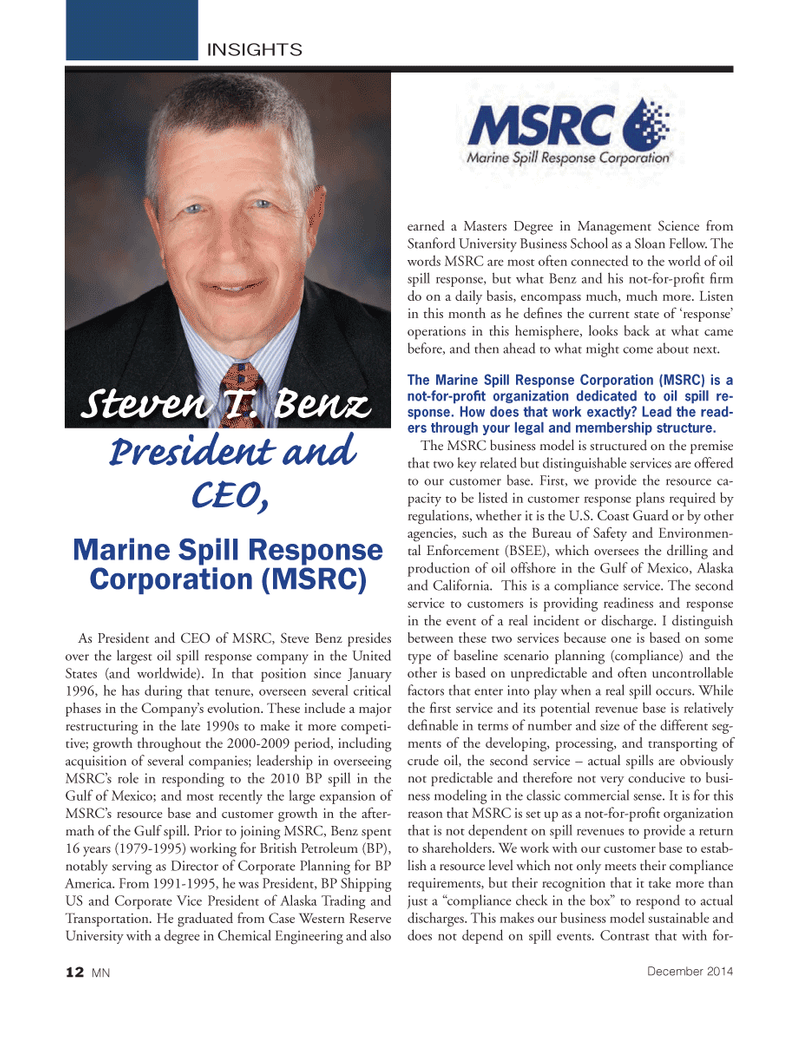
Page 12: of Marine News Magazine (December 2014)
Salvage & Spill Response
Read this page in Pdf, Flash or Html5 edition of December 2014 Marine News Magazine
INSIGHTSAs President and CEO of MSRC, Steve Benz presides over the largest oil spill response company in the United States (and worldwide). In that position since January 1996, he has during that tenure, overseen several critical phases in the Company?s evolution. These include a major restructuring in the late 1990s to make it more competi- tive; growth throughout the 2000-2009 period, including acquisition of several companies; leadership in overseeing MSRC?s role in responding to the 2010 BP spill in the Gulf of Mexico; and most recently the large expansion of MSRC?s resource base and customer growth in the after- math of the Gulf spill. Prior to joining MSRC, Benz spent 16 years (1979-1995) working for British Petroleum (BP), notably serving as Director of Corporate Planning for BP America. From 1991-1995, he was President, BP Shipping US and Corporate Vice President of Alaska Trading and Transportation. He graduated from Case Western Reserve University with a degree in Chemical Engineering and also earned a Masters Degree in Management Science from Stanford University Business School as a Sloan Fellow. The words MSRC are most often connected to the world of oil spill response, but what Benz and his not-for-pro t rm do on a daily basis, encompass much, much more. Listen in this month as he de nes the current state of ?response? operations in this hemisphere, looks back at what came before, and then ahead to what might come about next. The Marine Spill Response Corporation (MSRC) is a not-for-proÞ t organization dedicated to oil spill re- sponse. How does that work exactly? Lead the read- ers through your legal and membership structure. The MSRC business model is structured on the premise that two key related but distinguishable services are offered to our customer base. First, we provide the resource ca- pacity to be listed in customer response plans required by regulations, whether it is the U.S. Coast Guard or by other agencies, such as the Bureau of Safety and Environmen- tal Enforcement (BSEE), which oversees the drilling and production of oil offshore in the Gulf of Mexico, Alaska and California. This is a compliance service. The second service to customers is providing readiness and response in the event of a real incident or discharge. I distinguish between these two services because one is based on some type of baseline scenario planning (compliance) and the other is based on unpredictable and often uncontrollable factors that enter into play when a real spill occurs. While the rst service and its potential revenue base is relatively de nable in terms of number and size of the different seg- ments of the developing, processing, and transporting of crude oil, the second service ? actual spills are obviously not predictable and therefore not very conducive to busi- ness modeling in the classic commercial sense. It is for this reason that MSRC is set up as a not-for-pro t organization that is not dependent on spill revenues to provide a return to shareholders. We work with our customer base to estab- lish a resource level which not only meets their compliance requirements, but their recognition that it take more than just a ?compliance check in the box? to respond to actual discharges. This makes our business model sustainable and does not depend on spill events. Contrast that with for- Steven T. Benz President and CEO, Marine Spill Response Corporation (MSRC) December 201412 MNMN Dec14 Layout 1-17.indd 12MN Dec14 Layout 1-17.indd 1211/24/2014 3:52:33 PM11/24/2014 3:52:33 PM

 11
11

 13
13
